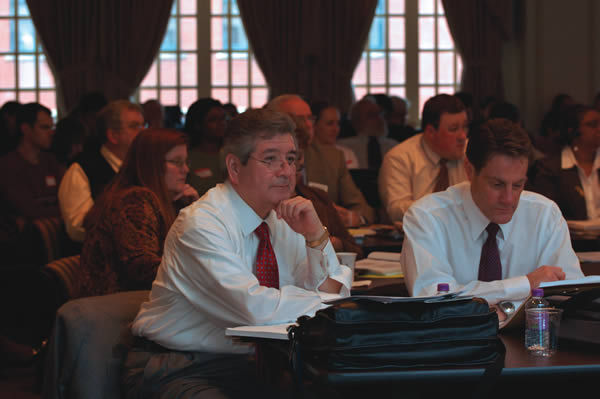Using in-house staff and expertise, and partnering with experienced public sector and non-profit players, the Indiana Supreme Court has begun a three-pronged attack in addressing the mortgage crisis.
The Supreme Court initiative to help homeowners who are facing foreclosure will focus on: 1) education for trial judges, 2) training and recruitment of volunteer lawyers, and 3) training and recruitment of attorney mediators. And the Court has a website dedicated completely to the mortgage foreclosure crisis at courts.in.gov/home.
“Indiana’s judicial system is prepared to be a full partner in this effort to confront the mortgage foreclosure crisis” said Chief Justice Randall T. Shepard, who set in motion the Court’s project.
Judges and lawyers for both lenders and borrowers face new legal and practical issues in the reality of today’s mortgage foreclosure crisis. The sheer volume of the foreclosures has caught many by surprise. Another new factor is the dizzying array of loan structures underlying the mortgage financing, some are familiar and legitimate and others are creative and predatory.
In addition, the day is largely a quaint memory of when the mortgage lender was the friendly neighborhood banker one saw in church or in the stands at the soccer field. Today, the mortgage loan is typically sold several times and repackaged so that the borrower often doesn’t know who to contact when there is a problem.
Like many courts, bar associations, legal services providers, and social workers across the country, the Indiana Supreme Court decided to move aggressively against the tide of foreclosures. Chief Justice Randall T. Shepard met with Lt. Governor Becky Skillman and pledged his support for her. She is overseeing ongoing efforts to assist homeowners through the Indiana Community Housing Development Agency and its Indiana Mortgage Foreclosure Network.

JIn his January 2009 State of the Judiciary address to the Indiana General Assembly, Chief Justice Shepard promised that the Supreme Court will train more lawyers in foreclosure matters than any other state Supreme Court.
The Chief Justice tapped David J. Remondini, Chief Deputy Executive Director of the Supreme Court Division of State Court Administration, to serve as overall project manager.
“This is a great opportunity for the Supreme Court to build on the strong foundations that have already been laid in this area by the Lieutenant Governor and Indiana’s legal service providers. I know the courts can help make a difference and I have complete confidence in Dave Remondini to lead this effort,” Chief Justice Shepard said.
One goal is to teach our state trial court judges about the current state of affairs in the national foreclosure crisis, and to help find answers to important questions including:
- What tools and tactics are judges using in other states to resolve cases in a way that is acceptable to both the borrower and the lender?
- What does President Obama’s recently announced housing rescue plan mean for Indiana borrowers?
- How will the several bills moving through the Indiana General Assembly have an impact on mortgage foreclosures?
Training is scheduled for judges at the annual Spring Judicial College and in April at the District meetings set for Indianapolis and in the southern half the state. The Indiana Judicial Center Executive Director, Jane Seigel, and its Education Director, Cathy Springer, will coordinate this effort.
The Supreme Court will recruit pro bono attorneys to represent borrowers in legal actions and pro bono attorney mediators to help resolve cases where a settlement is possible. The Court will also organize at more than two dozen sites free Continuing Legal Education sessions on mortgage foreclosure issues. In exchange for the free CLE credits, lawyers will agree to handle a few pro bono mortgage matters.
The plan is to hold attorney education sessions jointly with counselors from the Mortgage Foreclosure Network and, as they leave their training sessions, to link up the freshly trained lawyers with existing cases that have already been referred to the Network. This effort will utilize the Supreme Court’s network of pro bono plan administrators who operate local volunteer networks under grants from the Indiana Pro Bono Commission. Indiana Court of Appeals Judge Melissa May, who chairs the Pro Bono Commission, is coordinating this effort.
Julia Orzeske, Executive Director of the Indiana Supreme Court Commission on Continuing Legal Education, will spearhead the effort to train pro bono attorney mediators. She will help coordinate the training of mediators and match them up with cases that are suitable for mediation.
For more information please visit the Supreme Court foreclosure website at courts.in.gov/home or contact David J. Remondini by phone at 317.232.2542 or by email at: [email protected].